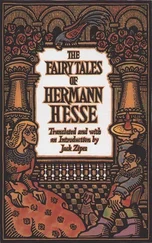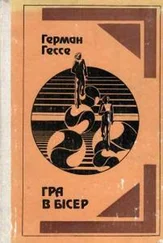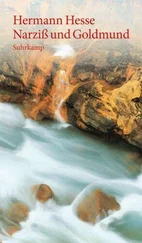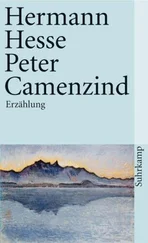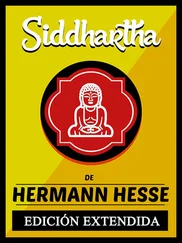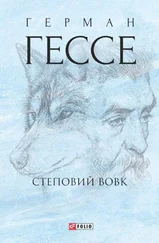The yogi had listened quietly to this outburst, with downcast eyes. Now he opened them and fixed his gaze upon Dasa’s face, a bright, piercing, almost unbearably firm, composed, and lucid gaze. And while he studied Dasa’s face, seemingly pondering his tale, his mouth slowly twisted into a smile, then a laugh. Soundlessly laughing, he shook his head, and said: “Maya! Maya!”
Utterly bewildered and shamed, Dasa stood stock still. The yogi, before his evening meal, took a short walk on the narrow path that led into the ferns. With quiet, rhythmic step he paced back and forth. After several hundred paces, he returned and entered his hut. His face was once more as it had always been, turned toward something other than the world of appearances. What had been the meaning of the laugh breaking through that impassive countenance? Had that terrible laughter at Dasa’s anguished confession and plea been benevolent or mocking, comforting or condemning, divine or demonic? Had it been merely the cynical bleat of an old man no longer able to take things seriously, or the amusement of a sage at another’s folly? Had it been rejection, farewell, dismissal? Or was it meant as advice, an invitation to Dasa to follow his example and join in his laughter? Dasa could not solve the riddle. Late into the night he continued to ponder the meaning of this laughter with which the old man seemed to have summed up his life, his happiness, and his misery. His thoughts chewed on it as if it were a tough root that somehow had a hidden savor. And likewise he chewed upon and pondered and mulled over the word that the old man had called out so loudly, so laughingly and gaily and with such incomprehensible amusement: “Maya! Maya!” He half knew, half guessed the general meaning of the word, and the intonation the laughing old man had given it seemed also to suggest a meaning. Maya — that was Dasa’s life, Dasa’s youth, Dasa’s sweet felicity and bitter misery. Beautiful Pravati was Maya; love and its delights were Maya; all life was Maya. To the eyes of this yogi Dasa’s life, all men’s lives, everything was Maya, was a kind of childishness, a spectacle, theater, an illusion, emptiness in bright wrappings, a soap bubble — something one could laugh at and at the same time despise, but by no means take seriously.
But although the yogi might be able to dismiss Dasa’s life with laughter and the word Maya, Dasa himself could not. Much as he might wish to become a laughing yogi himself, and to see his own life as nothing but Maya, the whole of that life had been roused in him once more during these restive days and nights. He remembered now all the things he had nearly forgotten when he found refuge here after the stresses of his life as a fugitive. There seemed to him only the slightest hope that he would ever be able to learn the art of yoga, let alone to become as adept at it as the old man himself. But then — what was the sense of his lingering in this forest? It had been an asylum; he had recuperated a bit and gathered strength, had come to his senses somewhat. That was something, was in fact a great deal. And perhaps out in the country the hunt for the Rajah’s murderer had ended and he could continue his wanderings without any great danger.
He decided to do so. He would depart next day. The world was vast; he could not remain in this hiding place forever.
This decision gave him a measure of peace.
He had intended to leave at dawn. But when he awoke after a long sleep the sun was already high in the sky. The yogi had begun his meditation, and Dasa did not want to leave without bidding good-by. Moreover, he still had a request to make. And so he waited, hour after hour, until the man rose, stretched his limbs, and began his pacing. Then Dasa once more blocked his way, bowed repeatedly, and obstinately remained until the master directed an inquiring look at him.
“Master,” he said humbly, “I am going my way. I shall no longer disturb your tranquility. But permit me a request this one last time, venerable father. When I told you about my life, you laughed and exclaimed, ‘Maya!’ I implore you, teach me more about Maya.”
The yogi turned toward the hut, his eyes commanding Dasa to follow. Picking up the water gourd, the old man held it out to Dasa, signing to him to wash his hands. Obediently, Dasa did so. Then the master poured the remainder of the water into the ferns, held the gourd out to Dasa once again, and asked him to fetch fresh water. Dasa obeyed. He ran, emotions of parting tugging at his heart, for the last time down the little footpath to the spring. For the last time he carried the light husk with its smooth, worn rim to the little pool which so often reflected in scattered flecks of light the muzzles of deer, the arching of treetops, and the sweet blue of the sky. Now, as he stooped over it, it reflected for the last time his own face in the russet dusk. He dipped the gourd slowly and thoughtfully into the water, feeling a weird sense of uncertainty. He could not understand why, or why it had hurt him, since he meant to leave anyhow, that the old man had not asked him to stay a while longer, or perhaps stay forever.
Crouching by the brink of the spring, he took a drink. Then he rose, holding the gourd carefully so as not to spill any of the water. He was about to return along the path when his ear caught a tone that both delighted and horrified him. This was the voice he had heard in so many of his dreams, that he had remembered with such bitter longing in many a waking hour. It coaxed so sweetly, sounded so charming, so childlike and loving in the dusk of the forest, that his heart shivered with fright and pleasure. It was his wife Pravati’s voice. “Dasa,” she called coaxingly.
Incredulously, he looked around, still holding the gourd; and suddenly she appeared among the tree trunks, slender as a reed on her long legs — Pravati, his unforgettable, faithless beloved. He dropped the gourd and ran toward her. Smiling, somewhat abashed, she stood before him, looking up at him with her big doe’s eyes. As he approached he saw that she wore red leather sandals and a beautiful, costly dress. There was a gold bracelet on her arm, and precious stones flashed in her black hair. He checked his stride. Was she still a rajah’s concubine? Had he not killed Nala? Was she still going about with his gifts? How could she come before him adorned with these clasps and gems and dare to call his name? ‘
But she was lovelier than ever, and before he had time to demand an explanation he could not resist taking her into his arms, pressing his forehead against her hair, raising her face and kissing her mouth; and as he did so he felt that everything had returned to him, that everything was his once more, all that he had ever possessed, his happiness, love, lust, joy in life, passion. All his thoughts had already moved far from the forest and the old hermit; the woods, the hermitage, meditation, and yoga had vanished, were forgotten. He gave not another thought to the old man’s gourd, which he was to bring back filled with water. It remained where he had dropped it by the spring as he rushed toward Pravati. And she, for her part, began hastily to tell him how it was she had come here, and all that had happened in the interval.
Her story was astonishing, astonishing and delightful, like a fairy tale, and Dasa plunged into his new life as if it were a fairy tale. Pravati was his again; the odious Rajah Nala dead. The pursuit of the murderer had long since ceased. But more than all that, Dasa, the prince who had become a herdsman, had been proclaimed the rightful heir and ruler. In the city an old herdsman and an old Brahman had revived the almost forgotten story of his expulsion and made it the talk of the country. He who had been hunted high and low to be tortured and executed as Nala’s murderer was now being sought much more ardently throughout the land, so that he could be brought solemnly to his father’s palace and installed as Rajah.
Читать дальше

